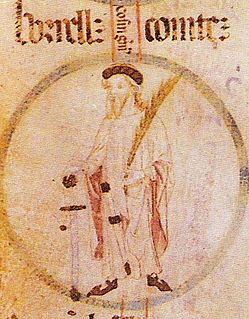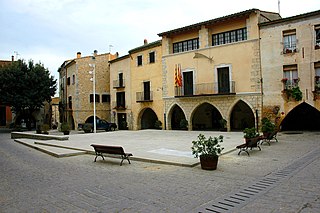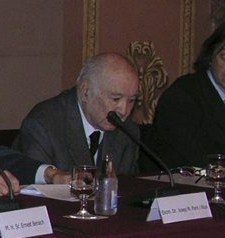
Bera was the first count of Barcelona from 801 until his deposition in 820. He was also the count of Razès and Conflent from 790, and the count of Girona and Besalú from 812 until his deposition. In 811, he was witness to the last will and testament of Charlemagne.

Joaquim Nadal i Farreras is a Spanish politician and historian from Catalonia. He is a professor at the University of Girona and was the Minister of Territorial Policy and Public Works of the Catalan Government, the Generalitat de Catalunya, from December 2003 to December 2010.

The Prince or Princess of Girona is a title that was historically the title accorded to the heir apparent or heir presumptive to the Crown of Aragon. Current legislation mandates the title of Prince of Asturias to the heir of the Spanish throne but allows for the use of other traditional titles; The current title-holder therefore, is Leonor, Princess of Asturias.

Borrell II was Count of Barcelona, Girona, and Ausona from 945 and Count of Urgell from 948.

Berenguer Ramon I [Berengar Raymond I], called the Crooked or the Hunchback, was the count of Barcelona, Girona, and Ausona from 1018 to his death.

The County of Barcelona was originally a frontier region under the rule of the Carolingian dynasty. In the 10th century, the Counts of Barcelona became progressively independent, hereditary rulers in constant warfare with the Islamic Caliphate of Córdoba and its successor states. The counts, through marriage, alliances and treaties, acquired the other Catalan counties and extended their influence along Occitania. In 1164, the County of Barcelona entered a personal union with the Kingdom of Aragon. Thenceforward, the history of the county is subsumed within that of the Crown of Aragon, but the city of Barcelona remained preeminent within it. Within the Crown, the County of Barcelona and the other Catalan counties developed a common polity known as the Principality of Catalonia.

Lluís Llach i Grande is a Spanish singer-songwriter and novelist from Catalonia. He is one of the main representatives of the nova cançó genre and an outspoken advocate of the right to self-determination of Catalonia. His most famous song, "L'Estaca", has become the unofficial anthem of the Catalan independence movement. He was a member of the Catalan Parliament from September 2015 until January 2018.

Peralada is a village in the province of Girona, Catalonia, Spain. It was the home of the Frankish Counts of Peralada who controlled this portion of the Marca Hispanica before becoming part of the lands held by the Count of Barcelona.
The Counts of Girona ruled over the County of Girona, the earliest-established of the Catalan Counties which formed the Marca Hispanica. The line was established by the Frankish noble Charles Rostan, Rostany, first Count of Girona (785-801) at the time of Sa'dun al Ruayni.

The Catalan counties were the administrative Christian divisions of the eastern Carolingian Hispanic Marches and southernmost part of the March of Gothia in the Pyrenees created after its Frankish quick counter conquest.

Martí de Riquer i Morera, 8th Count of Casa Dávalos was a Spanish–Catalan literary historian and Romance philologist, a recognised international authority in the field. His writing career lasted from 1934 to 2004. He was also a nobleman and Grandee of Spain.

The R1 is a line of Rodalies de Catalunya's Barcelona commuter rail service, operated by Renfe Operadora. It runs northwards from the Barcelona area to the southern limits of the province of Girona, passing through the coastal Maresme region. Since 2014, some services have been extended further north towards Portbou, near the French border. These services are designated RG1 and are considered part of the Girona commuter rail service. The line had an annual ridership of 28 million in 2016, achieving an average weekday ridership of 102,214 according to 2008 data.

Eduard Toldrà Soler was a Spanish Catalan conductor and composer.
Wilfred or Wifred, called the Hairy, was Count of Urgell, Cerdanya, Barcelona, Girona, Besalú and Ausona. On his death in 897, his son, Wilfred Borrell, inherited these Catalan counties.

The House of Montcada is an aristocratic and noble Spanish Catalan House.

The Legend of the Four Blood Bars is a legend about the origins of the Senyera Reial that appeared for the first time in 1551 at Segunda parte de la crónica general de España, a chronicle edited by Pere Antoni Beuter in Spanish in Valencia. This legend places the Senyera Reial origins on Wilfred the Hairy. Specifically, it narrates that the sign of the four bars was created after a battle against the Normans, when the King of the Franks doused his hands in the blood of Wilfred the Hairy's injuries. After swiping his fingers over the golden shield of the Earl of Barcelona he said: "These will be your arms, Earl".

The Raid of 897 was a military campaign of the Emirate of Cordova against the County of Barcelona.
Armand de Fluvià i Escorsa, is a Catalan genealogist and heraldist. He specializes in Catalan genealogies and in the dynasties of the counts of the Catalan Countries. He has also been a pioneer of the gay rights movement since the last years of the Francoist dictatorship. He was one of the founders of Nacionalistes d'Esquerra.
The Battle of Mollerussa took place in the south of the county of Urgell on 11 or 14 September 1102. In the battle, Count Ermengol V was defeated and killed by an Almoravid army. Mollerussa lies halfway between Bellpuig and Lleida and is the largest town in the Pla d'Urgell.

Albert Botran i Pahissa is a Catalan historian, politician and a member of the Congress of Deputies of Spain. He was previously a member of the Parliament of Catalonia.















